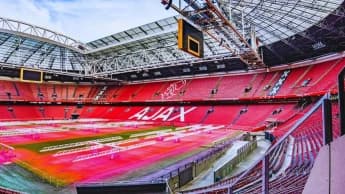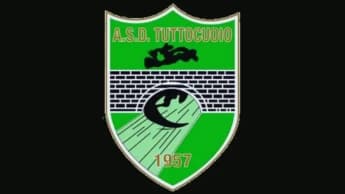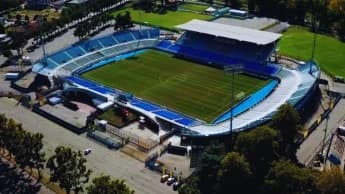
Al Nassr Football Club, founded in 1955, exemplifies success and ambition in Saudi football, blending local talent with global stars while aiming for elite achievements on various fronts.
Al Nassr Football Club, established in 1955 in Riyadh, Saudi Arabia, has emerged as one of the most prominent sports organizations in the country. The name translates to 'Victory,' symbolizing the team's ambition for success and the hopes of its dedicated fans. Founded by the Al-Ja'ba brothers, the club has evolved from modest beginnings into a formidable force in Saudi football, shaping the nation’s sports culture and broadening its influence on a global scale.
The rise of Al Nassr as a leading football club can be attributed to the foresight and leadership of Prince Abdul Rahman bin Saud Al Saud. Referred to as the 'Godfather of Al Nassr,' he held the position of club president for more than 39 years across three different terms. His influence was crucial in redefining the club’s identity and securing its promotion to the Saudi Premier League in 1963. Under his stewardship, Al Nassr transformed from a small second-division side into one of the most successful and celebrated teams in the nation.
The impact of Al Nassr goes well beyond the realm of football. It operates as a multi-sport organization, featuring active teams in handball, basketball, esports, volleyball, and various other sports. This inclusive approach guarantees that the club offers opportunities for individuals of all genders and ages to participate in sports, nurturing a community-centered culture that resonates with Saudi Arabia's overarching objectives of encouraging physical activity and promoting health.
Al Nassr's storied past is deeply connected to its pursuit of excellence. The club has been one of the select few that has participated in every season of the Saudi Pro League since it began, establishing itself as a fundamental part of the league’s narrative. Additionally, its commitment to developing talent has greatly influenced the Saudi Arabian national football team, with numerous iconic players, including the legendary Majed Abdullah, having come from Al Nassr’s youth academy. Abdullah, who holds the record as the club's all-time leading goal scorer, embodies the legacy of excellence that Al Nassr strives to maintain.
Accomplishments of the Team
Al Nassr has positioned itself as one of the most prestigious clubs in Saudi Arabia, with an impressive tally of 39 official titles. In the domestic arena, the club has won the Saudi Pro League championship 17 times, underscoring its supremacy in the highest level of Saudi football. Alongside its league successes, Al Nassr has also achieved six King's Cup victories, three Crown Prince's Cup titles, three Saudi Federation Cup titles, and two Saudi Super Cup championships, demonstrating its reliability and competitiveness in all significant domestic competitions.
In the continental arena, Al Nassr accomplished a remarkable feat in 1998 by winning both the Asian Cup Winners' Cup and the Asian Super Cup. These victories established the club's status as a powerful entity in Asian football and secured their participation in the first-ever FIFA Club World Cup in 2000. By representing the AFC region, Al Nassr became the inaugural Asian club to compete in this prestigious tournament, further reinforcing its global identity as 'The Global One (Al-Alami).'
In addition to its success in Asia, Al Nassr has also thrived in regional tournaments, securing two titles in the GCC Club Championship and one in the Arab Club Champions Cup. These victories have solidified the club’s reputation as a dominant force in Middle Eastern football, upholding a heritage of excellence that motivates both supporters and players. The honors achieved by the club reflect its unwavering quest for success and its capacity to compete effectively on various levels, both domestically and globally.
Tactical Approach and Playing Style
Al Nassr’s tactical strategy is founded on an attacking philosophy that prioritizes flair, creativity, and precise finishing. Under the leadership of Cristiano Ronaldo, the team has adapted to incorporate a playing style influenced by European techniques, characterized by rapid transitions, aggressive pressing, and accurate passing sequences. Typically, the team utilizes a 4-3-3 formation, which enhances width and enables their top forwards to exploit weaknesses in the opposing defense. Ronaldo’s impact goes beyond just scoring goals; his leadership and movement off the ball facilitate chances for his teammates to excel.
Controlling the midfield is a fundamental aspect of Al Nassr’s tactical approach. The club emphasizes the importance of agile midfielders who can manage the game's pace while playing crucial roles in both defense and attack. These midfielders are responsible for breaking through lines with forward-thinking passes, connecting play with the attackers, and offering defensive support when necessary. This equilibrium enables Al Nassr to take charge of possession and sustain control during critical matches.
In defense, Al Nassr maintains a compact formation to limit the space available for opposing attackers, focusing on swift recoveries and counter-pressing strategies. The fullbacks frequently take on a dual responsibility, contributing to offensive plays while upholding their defensive duties. This methodology guarantees that the team stays balanced and versatile, enabling them to modify their tactics in response to the strengths and weaknesses of their adversaries. Al Nassr's tactical development, propelled by prominent players and seasoned coaches, has established them as a powerful contender in both local and global competitions.
Strengths and Weaknesses
Al Nassr's strengths are rooted in its history of resilience, strategic investments in skilled players, and a strong club culture founded on teamwork and perseverance. The signing of Cristiano Ronaldo in January 2023 represented a pivotal moment, drawing global attention to Saudi football. Ronaldo’s arrival underscored Al Nassr’s goal of attracting top European talent and enhancing the Saudi Pro League’s profile on the international stage.
Nevertheless, in spite of their stronghold on domestic competitions, Al Nassr faces areas in need of enhancement. The club has historically encountered difficulties in clinching continental titles, particularly in the Arab Club Champions Cup, which has hindered their ability to establish complete dominance in the continent. While they have firmly asserted their presence locally, the pursuit of consistent success on continental and global stages presents ongoing challenges that necessitate continual advancements in infrastructure, talent acquisition, and strategic development.
Tactics and Playing Style
Al Nassr's style of play is marked by dynamism and flexibility. The team adopts an aggressive offensive strategy, focusing on rapid transitions and high-energy gameplay. Their dedication to attacking football enables them to take control of matches, apply pressure on their opponents, and sustain a fast-paced tempo. This resilience is bolstered by a robust midfield, speedy wingers, and a versatile forward line.
The addition of players such as Cristiano Ronaldo enhances their attacking options, merging global expertise with local skills. The team's dedication to blending international experience with homegrown talent has created a well-rounded and versatile strategy that aims for both immediate success and sustained performance over time.
Memorable Matches
Throughout its history, Al Nassr has participated in numerous matches that have shaped its legacy and identity. A significant highlight was the victory in the 1998 Asian Cup Winners' Cup against Suwon Samsung Bluewings, celebrated by 70,000 enthusiastic fans in Riyadh. This win became emblematic of Al Nassr’s goals on the continental stage and showcased their determination and resilience.
An additional memorable achievement was Al Nassr's participation in the inaugural FIFA Club World Cup in 2000, where they faced renowned teams such as Corinthians and Real Madrid. This event made Al Nassr the first Asian club to take part in this worldwide tournament, showcasing their ambitions on an international scale and their resolve to compete against the world's elite.
In Saudi Arabia, the intense rivalry with Al-Hilal, referred to as the Riyadh derby, continues to captivate fans across the nation. This matchup is regarded as one of the most thrilling encounters in the country, attracting large audiences and showcasing the fierce competition inherent in Saudi football.
Outlook for the Future
Al Nassr is focused on achieving success both continentally and globally by establishing ambitious objectives, backed by strategic planning and substantial investments in talent. The acquisition of Cristiano Ronaldo has not only enhanced their international profile but also paved the way for additional high-profile European players to enter the Saudi Pro League. This strategic move is expected to draw international talent, stimulate local interest, and improve the overall competitiveness of the league.
The future objectives encompass enhancing their youth academy to ensure a steady stream of young talent for the first team, bolstering a strong sports infrastructure, and improving facilities to align with global competition standards. With a dedicated leadership structure, strategic partnerships, and the support of their fans, Al Nassr aspires to establish itself as a prominent global brand, continuously striving for continental championships and setting new standards in international competitions.
Supporter Experience
For the fans of Al Nassr, experiencing a game in the stadium is filled with immense pride and fervor. The atmosphere during Al Nassr matches is vibrant, with roars of chants, colorful flags, and banners that contribute to an unforgettable experience. The stadium stands as a bastion of loyalty, where dedicated fans support the team through every victory and defeat. Additionally, Al Nassr's focus on multi-sport initiatives ensures the club appeals to a diverse audience, promoting engagement and support across various age ranges and genders.
The stadium is equipped with facilities aimed at enhancing accessibility for individuals with disabilities, along with upgraded seating options and exclusive luxury boxes, prioritizing both comfort and inclusivity in the game-day experience. The incorporation of state-of-the-art training facilities and designated fan zones ensures that supporters maintain a close connection with the team, nurturing a community spirit that extends beyond sports and integrates into the cultural fabric of Saudi Arabia.
Al Nassr's dedication to excellence, resilience, and transformation has established the team as not only a leading force in Saudi Arabia but also a symbol of ambition in the world of football. Their rich history, notable achievements, strategic approaches, and future goals embody a team that is deeply committed to attaining success and global recognition, ensuring their ongoing development on both continental and international platforms.





